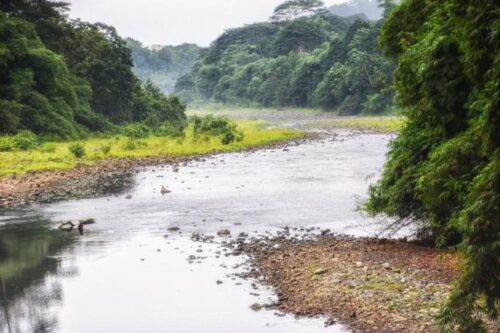The shadow of China.
The economy of São Tomè and Princìpe is poor. The main resources are linked to the tourism, fishing, and cocoa sectors, with most of the population working in public services and agricultural and
subsistence activities.
The succession of various governments over the years has not created the conditions to put a stop to rampant poverty, while at the same time extinguishing a lack of hope in the population for decent development. External aid accounts for 90% of revenue. Furthermore, the agricultural transformation process aimed at reducing the country’s dependence on cocoa production, as well as at achieving food self-sufficiency – considering that 90% of foodstuffs are imported – has never been completed, despite the wealth of water resources and the excellent climatic conditions that would allow the development of tropical agriculture. Furthermore, the country lives in a sort of state of isolation, both internal and external, determined by the reduced communication routes limited internally to about 380 km of roads.

A river that crosses the jungle of the island of Sao Tome, and that joins to the sea. 123rf.com
As for external contacts, the capital is the largest airport and port centre for the entire archipelago connected with Cameroon, Angola, and Gabon. The country does not have its own industrial system and trade with foreign countries, which shows a large deficit that is mainly with Portugal, Germany, and Belgium, to which cocoa, copra, and coconuts are exported, while fuel and foodstuffs are imported.
Although the country abounds in waterways, the rivers are not big enough to develop large hydroelectric plants. The country lacks mineral resources even if, since the early 1990s, it has claimed an area located within the Gulf of Guinea, while in 2001 it entered into an agreement with Nigeria relating to the exploration of oil fields in the Joint Development Zone (JDZ), an overlapping area of maritime borders approximately 125 miles (200 km) from the Nigerian coast.
These agreements, however, proved unfavourable for the country as Nigeria obtained the main revenues.

Chinese State Councillor and former Foreign Minister Wang Yi (R) meets with Edite Ten Jua, foreign minister of Sao Tome and Principe (Xinhua/Li Yan)
In recent years, however, the archipelago has recorded positive growth rates in its economy due to the implementation of the public investment program, financed by the World Bank, the African Development Bank, and the People’s Republic of China. With the latter, in particular, since 2018 the country has embarked on a close relationship of collaboration that has produced immediate changes, generated by a large mass of liquidity inserted by the Chinese into the economic circuits of the country. A further breath of fresh air for the country’s economy also came from the inclusion, in 2017, of the archipelago in the Macao Forum, an organization that unites the eight Lusitanian-speaking countries (Portugal, Cape Verde, Guinea Bissau, São Tomè and Princìpe, Angola, Mozambique, East Timor, Macao, and Brazil) and China in the development of a privileged economic alliance. Relations with China are also allowing the country to develop some infrastructure projects including the construction of a deep-sea port for long-range cargo activities and the upgrading of the airport.

São Tomé. Santa Catarina Telecommunications Station. CC BY-SA 4.0/ Ji-Elle
Within the cooperation relationship between China and São Tomè and Princìpe, there are several actions promoted by the Chinese side, including the disbursement of aid of 146 million dollars for economic, scientific, and cultural cooperation, with the promise to gradually increase the size of the investment; a donation of ten thousand tons of rice to guarantee policies of greater security of food supply; and, the condoning of the Chinese debt of 28 million dollars, thanks to which the archipelago was also able to align itself with the parameters of containment of the public debt at 1, 8% in 2017, as required by the International Monetary Fund.
Furthermore, China has become the protagonist of the conversion of radio-television infrastructures by making the transition from analogue to digital and, therefore, the modernization of networks, as well as the construction of a building to house the national radio and public television. This has broken the US monopoly regarding radio broadcasting, also creating obstacles to their military hegemony built up over the years, also through the control of such equipment used for the control of the Atlantic coast of Africa.

Downtown São Tomé. CC BY 2.0/Ben Sutherland
Faced with such privileged relations with China, the archipelago broke off its diplomatic relations with Taiwan and approved visa waiver for Chinese citizens.Acts of cooperation were also undertaken on the energy front with China willing to support the country also in this area for the development of the renewable energy sector. The Government of the country is working to obtain a renewable energy rate of 50% in its energy mix by 2030 through the launch of the National Action Plan for Renewable Energy and that of the National Action Plan for Energy Efficiency. These plans are also supported by the United Nations Industrial Development Organization (UNIDO). These actions, if carried out consistently, could constitute a great turning point for the country and its population, representing a form of redemption after centuries of suffering, and an opportunity to rekindle hope for a better and sustainable future. (Open Photo: Santo Antonio, capital of Principe Island. 123rf.com)
Filippo Romeo



